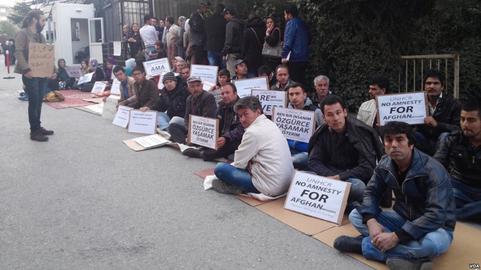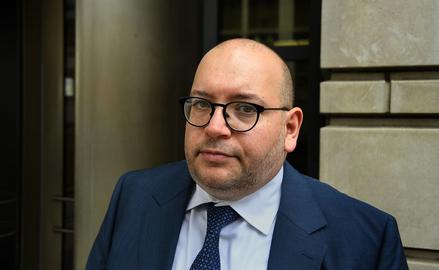Immigrants and asylum seekers in Turkey can be divided into three categories. The first group are political or non-political refugees who have presented themselves to the United Nations High Commissioner for Refugees (UNHCR); the second group are people who are not seeking asylum but want to reside in Turkey for various reasons such as business; and the third group are illegal immigrants who use the services of human traffickers in order to travel and live in a third country (not in Iran or Turkey). Each group has its own crazy world, each with infinite stories.
From Van in the east to Izmir in the West, many small cities in Turkey are home to thousands of asylum seekers, each of whom has a case with the UNHCR. After registering, they are given an interview date. If approved in the first interview, asylum seekers must then pass a second interview. After this, they wait to be assigned to a country. This process can take several years.
I met an Iranian family in Ankara who had been waiting for an answer for more than 12 years. Like all other refugees in Turkey, they live in the city that was assigned to them, cities that, in many cases, are under-resourced and lack adequate infrastructure. The roads, houses and buildings all look more like structures you'd find in a village, not a city. The family is required to go to the police station every week to confirm their presence in the assigned city. If they want to leave for any reason, they must obtain written permission from the police. Living in a city other than the one they have been assigned is illegal, and their children cannot go to any school other than the ones in their allocated city of residence.
Mistrust, Insecurity and Spying Accusations
The feelings of mistrust and insecurity are palpable among asylum seekers in Turkey. No matter how they got there, what their case is, or at what stage they are in their applications for asylum, no one really trusts anyone else, and every Iranian tries to isolate themself from every other Iranian. Apparently, this feeling of insecurity runs so deep that even when people reach their destinations, they don’t trust other Iranians and will try to distance themselves from their fellow countrymen.
A common story I heard was the rumor that some Iranians were acting as spies for the Islamic Republic, or were Islamic Revolutionary Guard Corps (IRGC) informants or snitches. Almost everyone has their own theory of who is a spy or who works for the regime, and they are not afraid to talk about it.
Financial struggles also contribute to the problem, especially when asylum seekers have to wait for long periods of time. There are those who either don’t have a job or get paid too little for long hours of work and are therefore dependent on financial support from their families in Iran. However, considering the depreciation of the Iranian rial, such support is no longer even helpful. So asylum seekers turn to international human rights organizations for help. This has led to an even greater level of distrust, as there are individuals who have received financial packages multiple times while others have not received a penny.
In addition to their complaints regarding the lengthy UNHCR process, asylum seekers in Turkey feel disappointed with and abandoned by human rights organizations. Many of them feel as if these organizations have stopped caring about them now that they have left Iran. Some asylum seekers describe themselves as “news fuel” for these groups. Once they issued statements in support of these individuals when they were arrested or imprisoned. But now that they are asylum seekers and have left Iran, they say, the groups regard them as "useless."
Istanbul and Iranians Looking to “Live in Peace”
The second group of immigrants, those people who aren’t seeking asylum and simply want to reside in Turkey, can often be found in Istanbul. Many of them arrive, with or without money, in the hopes of attaining “peace of mind,” as they put it. I met many single Iranian women in Istanbul who chose to make the city their home, and who told me: “we live in peace here.” Usually, Iranian women engage in two types of employment – as language instructors or hair and beauty stylists. Turkish firms and companies also hire Iranian immigrants, male and female.
There are also Iranian activists and journalists living in Turkey, many of whom don’t intend to seek asylum. One of them told me: “Identifying as a refugee is a disgrace.” Some Istanbul neighborhoods are full of young Iranians looking for jobs or places to rent. For them, it’s important to find a place to live close to their home country, somewhere that shares their culture.
Recently, the Turkish government added another requirement for those applying for residency or jobs: a clean criminal record. This poses a problem for many political activists who have criminal cases against them — most of them have faced charges of endangering national security. I was told that because of this new law, in the last several weeks many Iranians have been deported or have been blacklisted and so face deportation in the future.
Changes in Turkish law will continue to impact on Iranian immigrants and asylum seekers. Many of them have expressed anxiety since a change to the law means the Turkish government is in charge of refugee affairs instead of the UNHCR.
Iran and Turkey signed a mutual treaty on the extradition of criminals years ago, and Iranian refugees are concerned that the treaty could threaten their status in Turkey. Prominent human rights figures have argued that the extradition of political refugees is against international law and, if carried out, the UN can be held responsible. But they also believe these changes could be beneficial for asylum seekers and might result in greater efficiency and a decrease in waiting times. In 2019, a first step will be the removal of the requirement that refugees report to the police station on a weekly basis. In addition, there are further plans to establish more offices for processing refugees in smaller Turkish cities.
Illegal and Legal Immigrants
The third group of immigrants — those individuals who regard their time in Turkey as a temporary stop before moving on to Western European countries, and who may be in the country legally or illegally — can be found throughout Istanbul, especially in central areas of the city, like the Aksaray neighborhood.
Sajad is one of them. I found him on Istiklal Street, where I was watching a street performance by some Iranian musicians. He was lip-synching with the singer, a smile on his face, when I said hello to him.
He had been there illegally for the last 45 days and wanted to go on to Western Europe, with help from a trafficker. Before coming here he had been living in Isfahan in Iran, where his elderly and sick mother lives. According to him, her only dream is her son’s success in Europe. But for the last three weeks, he has been living in parks and streets. One of his roommates stole and ran away with his and their other roommate’s money. Sajad, now without any money, has no option but to hang around the streets of Istanbul until he finds a way to get back to Iran.
There are many immigrants who, after a few months of living in Turkey, decide to go back. One of the ways to return to Iran for those who have valid IDs is through smuggling goods. A smuggler buys bus tickets for the travelers and gives each individual a package to take with them to Iran. Some Iranians also make money by transiting goods this way. One of the smugglers told me each traveler can make up to US$1,000 by doing this four times a month. According to him, as well as what I have personally observed in his office, most of his collaborators are women – and they are from all walks of life.
The job market for refugees in Turkey is horrendous. In order to obtain a work permit, a refugee must have a statement from an employer confirming that they require that specific individual for their business. But employers prefer to employ refugees illegally so that they can pay them less and avoid taxes. As a result, refugees work for up to 14 hours a day, suffer from abuse and racism from both their employers and customers, and, in many instances, are fired without being paid.
An Iranian Baha’i boy in Ankara told me he was serving customers in a restaurant when a customer bullied him so badly for wearing earrings that he left the job. Many women told me stories of them being sexually harassed by both their employers and their customers. Refugees in Turkey also work in hard labor for very little money. However, there is nowhere for them to complain about their unfair conditions, and they have no option but to carry on.
Some are determined to reach Europe, and most of these hopefuls have the required funds and are either looking for a human trafficker to take them, or are waiting for the "green light" from their contact in order to begin the journey. But if they have to wait for long periods of time, they will have to enter the job market – together with other immigrants who don’t have the necessary funds and who plan to work for a few years in Turkey in order to save enough money for their journey to the West.
I also encountered many travelers who ended up colloborating with human traffickers in order to make a living or to help them save money. In some cases, human rights activists and journalists who have been waiting long periods in Turkey become involved in the human trafficking business, working as dealers between the trafficker and clients, and receiving commissions. They live among human traffickers and become friends with them. Stress and anxiety are part of the job, but the world of asylum-seeking, refugees and immigration has left them with no other options.
Aside from all the pain and suffering in the asylum-seeking world, the refugees I meet are full of hope and are ready to take on the risks of the journey ahead. Many of them are exhausted, and many are disappointed and feel let down by human rights organizations. Fear and insecurity are common feelings. Those who plan to continue their journey illegally do not know what to expect, but assume that getting to their desired destination will be the end of their suffering. Far too many times I heard the following statement from travelers in Turkey: “This is Turkey, the end of hell.”
Also in the series:
The Story of an Afghan Boy Trying to get to Iran
The Love of my Child kept me Alive in the Mountains of Iran and Turkey
visit the accountability section
In this section of Iran Wire, you can contact the officials and launch your campaign for various problems

























comments